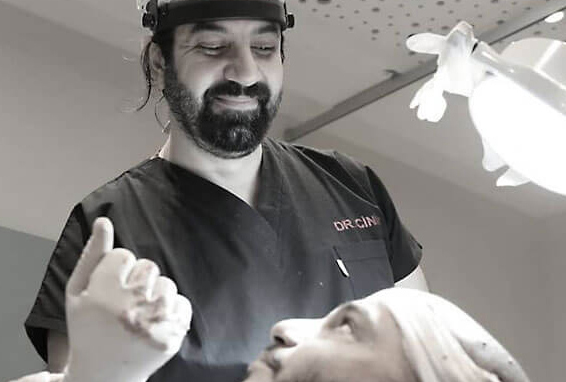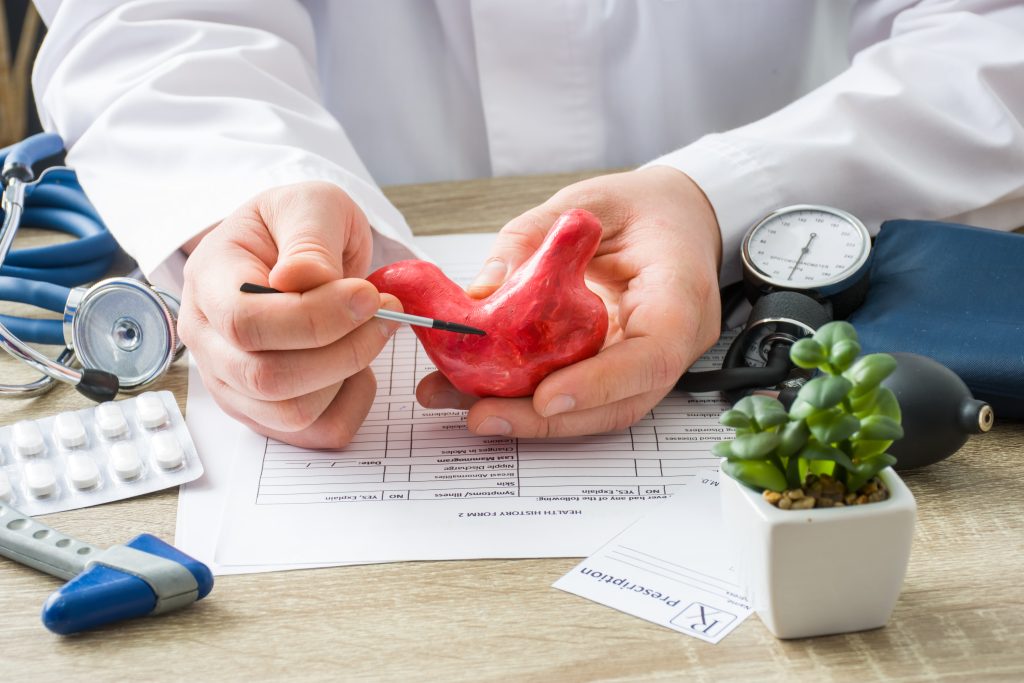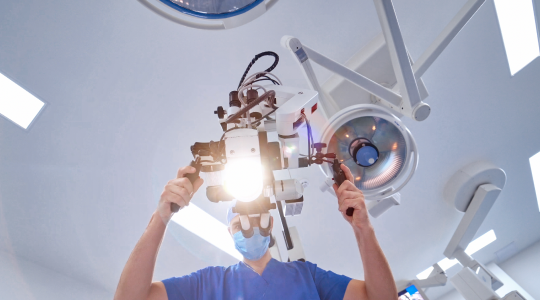
Gastric Band


Up to 70% savings
BMI criteria more
flexible than in France
Priority Treatment in English
and rigorous long term follow-up


Save up to 70%
80% Cheaper Than the UK, the US, Canada and Ireland
Globally acclaimed obstetric surgeons at your service
English-Speaking Care & Thorough Post-Op Follow-Up
High approval with 98% satisfied patients

Gastric band in Turkey is a bariatric surgery procedure that aims to decrease stomach volume and slow food passage
This so-called “restrictive” technique does not interfere with food digestion. This mechanism results in faster satiety and thus promotes weight loss.
The gastric band in Turkey allows the loss of 40 to 60% of excess weight. These results benefit from 10-year hindsight. Planning this type of intervention also helps to reduce the risk of developing diseases related to obesity.
As with any obesity surgery, to benefit from this treatment, it is necessary to complete specific criteria. It is necessary to have a sufficient BMI, to follow a nutritional plan and to have a complete preoperative check-up. The installation of a gastric band involves profound changes over the long term. Its success depends on the full involvement of the patient.
In the UK, many patients forgo the procedure for financial reasons Even though part of the procedure can get on the NHS, the criteria for the procedure and the wait to be covered is too long for many patients to have the procedure.
Planning a gastric band surgery in Turkey allows you to get the best care at the lowest cost. With Body Expert, benefit from the expertise and know-how of the best Turkish bariatric surgeons and personalised support in English.
An adjustable gastric band is one of several techniques for bariatric surgery. It is offered to a patient when appropriate for their type of obesity and health condition.
The procedure involves placing a band around the upper part of the stomach, creating a small pouch. Since little food is needed to fill the small pouch, the feeling of satiety arrives more quickly. Like an hourglass, the food will gradually flow and be properly digested.
The gastric band in Turkey differs from other bariatric surgery procedures in that it is an adjustable technique. The band is connected by a small tube to a control box placed under the skin. The control box can be tightened or loosened by injecting a liquid through the skin. Contrary to sleeve or gastrectomy (operation consisting in removing a part of the stomach) and bypass (technique which consists in reducing the assimilation of food, thanks to a short-circuit of a part of the stomach and the intestine), the ring can be removed during a new operation. This request can be made in case of complications, inefficiency or at the patient’s request. Gastric band in Turkey takes 1 hour and requires a hospital stay of 2 to 3 days. Most of the time, the procedure is performed by laparoscopy.
Obesity surgery is for people who are severely overweight. To be eligible for the band, it is necessary to meet several criteria.
Gastric band is for people over the age of 18 with massive (BMI ≥ 40) or severe (BMI ≥ 35) obesity. Body mass index (BMI) is based on height and body weight. According to the World Health Organization, “High BMI is associated with 21% of ischemic heart disease, 23% of stroke, 58% of type 2 diabetes and 39% of hypertension. The higher your BMI, the higher your risk of these chronic diseases. That’s why gastric bands may be recommended to combat obesity and limit the development of related diseases.
In addition to the BMI criterion, the patient must have unsuccessfully attempted to lose weight through multidisciplinary medical management. This multidisciplinary management is based on dietary follow-up, the implementation of regular physical activities and psychological management. These measures must be instituted over several months.
The pose of a gastric band in Turkey can only be considered after a complete health check-up has been carried out and after having obtained a favourable opinion from various health professionals.
Gastric band in Turkey has several contraindications. A patient will not be able to have this bariatric surgery procedure if:
Any contraindication to general anaesthesia also represents a barrier to placing a gastric band in Turkey.
The absence of prior medical care and the foreseeable inability of the patient to participate in
The lack of prior medical care and the foreseeable inability of the patient to participate in a lifelong medical follow-up are also among the contraindications to the procedure.
The NHS evaluates each person who may be considered for a gastric band on a case-by-case basis. Some general criteria are considered when making the decision:
If you meet all these criteria, you can benefit from the gastric band. If you are referred for surgery, you will likely undergo a six-to-twelve-month weight loss program, in which you must show that you are committed to lifestyle changes. More about how to get weight loss surgery on the NHS
Upon completing the program, you will be placed on the waiting list for surgery. Due to the high demand and limited resources of the NHS, it is not certain that you will be operated on. Candidates for a gastric band in the UK can wait more than 18 months, with no guarantee of access.
The installation of a gastric band, and, more broadly, all the bariatric surgery techniques represent a significant cost for many patients seeking an effective solution to fight against severe or massive obesity.
Les prix pratiqués ainsi que les faibles remboursements offerts par les mutuelles ne permettent pas à un grand nombre de patients d’avoir recours à cette technique.
Scheduling a gastric band procedure in Turkey allows you to benefit from prices XX times lower than in the UK. In addition to offering interesting rates, Turkey has excellent bariatric surgeons and state-of-the-art equipment. At Body Expert, the surgeons who intervene in installing a gastric band in Turkey are all selected with rigour. Before, during and after the procedure, patients benefit from tailor-made care in English and a long-term accompaniment.
Before and after gastric band, it is necessary to be accompanied at all stages of preparation and rehabilitation. Upstream, this support is essential to prepare the patient to adopt new and healthy lifestyle habits. After the surgery, it helps the patient learn to use the ring and manage his or her meals. Body Expert provides a rigorous follow-up of its patients to ensure that they recover properly and that no complications arise after the surgery.

Our meticulous selection process identifies only the top-tier weight loss surgery clinics and eminent surgeons in Istanbul and Antalya. With Body Expert, you’re aligning with unparalleled professionalism and surgical expertise.
We pledge unwavering monitoring of each stage of your medical journey, combining it with absolute transparency. This commitment guarantees you a reliable and fully integrated care experience.
Your entire experience with Body Expert is streamlined and straightforward, facilitated by dedicated professionals proficient in the English language, ensuring clarity at every juncture.
In the ever-evolving world of medical tourism, enduring post-surgery care is paramount. Body Expert remains steadfast in its commitment to patients, consistently prioritizing their ongoing health and well-being with our affordable healthcare promise.
Entrust your health journey to Body Expert. As leaders in medical tourism, we offer bespoke guidance and steadfast support for those seeking gastric band surgery in either Istanbul or Antalya. Our unwavering commitment is to provide superior care at competitive rates, all while ensuring seamless communication in your chosen language.
From your first inquiry to post-operative aftercare, a devoted Body Expert advisor will accompany you, ensuring you’re continually informed and comforted. By opting for gastric band surgery in Turkey with Body Expert, you’re tapping into our extensive experience and standing to benefit from significant savings—potentially up to 80% less than typical costs elsewhere.
8719 vues
0 commentaires
0
7557 vues
0 commentaires
2
The expected benefit of the surgery is the loss of a large amount of excess weight. This excess weight is lost, without being regained over the long term. The average loss of excess weight to be expected with gastric banding in Turkey is 40-60%. This excess weight corresponds to the number of kilos the patient has more than your expected ideal weight. 20 to 30 kg on average is lost with such bariatric surgery.
Too high a BMI reduces life expectancy by a few years. Obesity impairs quality of life and increases the risk of developing cardiovascular diseases such as high blood pressure, coronary artery disease, stroke, or heart failure. By promoting weight loss, gastric band also reduces the risk of developing metabolic diseases such as diabetes and steatosis of the liver. Obesity is also associated with a risk of developing several cancers. Gastric band in Turkey helps decrease the risk of developing breast, esophageal, rectal and kidney cancer.
Using a gastric band in Turkey can improve the quality of life and life expectancy. The procedure also reduces fertility problems experienced by obese people. Also, this technique allows a reduction of liver diseases not related to alcoholism.
The procedure should be preceded by a complete checkup of the patient’s health, but also the adoption of new lifestyle habits, which combine a healthy and balanced diet and regular physical activity.
Before a gastric band in Turkey, it is essential to perform a complete health assessment of the patient. The different check-ups to be followed are:
The patient is invited to meet with several specialists (surgeon, nutritionist, dietician, psychiatrist or psychologist, anesthesiologist, etc.), to perform various examinations. Among the examinations to be carried out with the installation of a gastric band in Turkey are blood tests, an oesogastroduodenal endoscopy, X-rays and an evaluation of the respiratory and cardiac function.
Performing these tests can detect possible pathologies such as nutritional or vitamin deficiencies, diabetes, high blood pressure, or heart problems.
In addition to a complete checkup, there is a checkup of eating habits and physical activity. Before surgery, essential to change eating habits and turn to appropriate physical activity.
After these checkups, the operation may be feasible, require a complementary preparation phase or may not be able to be held safely for the patient.
After gastric band, the patient must follow a healthy lifestyle and diet rules daily. Taking dietary supplements is also required to make up for dietary deficiencies.
After gastric band in Turkey, the amount of food ingested is greatly reduced. At first, the patient must eat liquid, then soft and finally solid. The patient should eat a healthy and balanced diet. It is recommended to avoid all sugary and high-fat foods such as ready-made meals and to replace them with protein sources, fruits and vegetables. It is also essential to take time to eat and to devote between 30 and 45 minutes is the minimum for each meal.
Throughout his life, the patient must maintain healthy eating habits. In addition, it is important to practice regular physical activity. This can include walking, biking or even swimming.
After a gastric band in Turkey, the patient will absorb fewer nutrients, automatically creating deficiencies. To guard against the risk of dietary deficiencies, especially in calcium, iron, zinc, copper, and vitamins (B1, B6, B9, B12, A, C, E and K), taking dietary supplements is essential.
The gastric band is connected by a small tube to a control box under the skin. Through this box, the doctor can adjust the band’s pressure by injecting a liquid. This process allows the restriction of the gastric pouch to be adjusted. Thus, by increasing or decreasing the pressure, the physician can adjust the size of the pouch to meet the individual needs of each patient.
The gastric band cannot be placed indefinitely. In fact, the band’s materials have a limited lifespan of 10 years. After this time, it will be necessary to remove the gastric band by scheduling a new surgery.
Gastric band has several advantages over other bariatric surgery techniques. First of all, it is a reversible procedure. Unlike other bariatric surgeries such as sleeve gastrectomy or gastric bypass, the entire stomach is retained. Thus, if the results are unsatisfactory or complications arise, the gastric band can be removed. This is also the case once the patient has lost the desired amount of weight and his or her weight has stabilised.
Gastric band in Turkey also reduces the risk of nutritional deficiencies associated with other bariatric surgeries. Finally, the procedure is less complex than other bariatric surgery techniques and has less risk of complications.
The Gastric Band is the least scary technique, and it has the least operative risks. Nevertheless, this device still has some disadvantages. The main disadvantage of gastric band in Turkey compared to other bariatric surgery techniques is the risk of weight regain after the band is removed. Getting a gastric band is just one step in a long journey to a healthier life.
The gastric balloon is installed without surgery in the stomach with the aim of occupying part of it and allowing weight loss through satiety and slowing down the transit of food. The use of a gastric balloon is not indicated for weight loss for aesthetic purposes only but for the treatment of obesity. It is considered for obese people with a body mass index (BMI) between 30 and 40. Simple and fast, the installation of the gastric balloon is carried out without significant problems. Nevertheless, the gastric balloon has a shorter effect than the gastric band. Its use is limited in time and often leads to a rapid recovery of the lost weight.
Gastric band in Turkey is a low-risk procedure, with few immediate post-operative complications. Nevertheless, in the long term, several problems may arise. The band may slip down the stomach wall causing severe pain and vomiting. The case can become disconnected from the catheter, making the ring ineffective. The surgeon must then intervene again to reconnect the device to the catheter. The ring can also become pierced and impossible to inflate. It is then necessary to change the ring and plan another intervention.

















